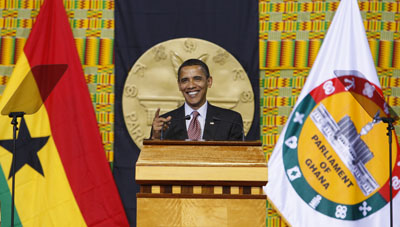
Speaking in Ghana today, President Obama struck a tone unique in speeches from U.S. presidents in Africa. Drawing on his Kenyan heritage — and highlighting his grandfather’s life in a British colony and his father’s childhood as a goat herder — the president conveyed with a distinctive authority his message that “Africa’s future is up to Africans.”
President Obama specifically addressed democracy, good governance, public health, and conflict resolution. He commended Ghana for the example it has set for Africa, but also called on model countries to do more to promote these principles across the continent:
[U]ltimately, it will be vibrant democracies like Botswana and Ghana which roll back the causes of conflict and advance the frontiers of peace and prosperity.
In the portion of the speech that we at Enough were most attentive to, President Obama noted that while “perpetual war” has become Africa’s “crude caricature,” conflict is a daily reality for far too many Africans. He acknowledged the role tribal, ethnic, national, and religious differences play in inciting and fueling conflicts, but noted that drawing on this diversity to define people in opposition to others “has no place in the 21st century.” Rather, we should seek to emphasize the commonalities between people – our “common humanity,” as the president said. He issued this call:
[W]e must stand up to inhumanity in our midst. It is never justified, never justifiable to target innocents in the name of ideology. It is the death sentence of a society to force children to kill in wars. It is the ultimate mark of criminality and cowardice to condemn women to relentless and systemic rape. We must bear witness to the value of every child in Darfur and the dignity of every woman in the Congo. No faith or culture should condone the outrages against them. And all of us must strive for the peace and security necessary for progress.
Citing few specific cases, the president described his vision for America’s response to Africa’s conflicts:
America has a responsibility to work with you as a partner to advance this vision, not just with words, but with support that strengthens African capacity. When there’s a genocide in Darfur or terrorists in Somalia, these are not simply African problems — they are global security challenges, and they demand a global response.
And that’s why we stand ready to partner through diplomacy and technical assistance and logistical support, and we will stand behind efforts to hold war criminals accountable. And let me be clear: Our Africa Command is focused not on establishing a foothold in the continent, but on confronting these common challenges to advance the security of America, Africa and the world.
In Moscow, I spoke of the need for an international system where the universal rights of human beings are respected, and violations of those rights are opposed. And that must include a commitment to support those who resolve conflicts peacefully, to sanction and stop those who don’t, and to help those who have suffered.
Clearly, President Obama’s speech was magnificently scripted and movingly delivered. As we’ve seen from his podium at the U.S. Capitol rotunda in Washington, to the University of Cairo, and now to Ghana’s Parliament in Accra, the president has a masterful ability to address diverse audiences and sensitive topics in ways that leaves listeners thinking that perhaps this time things will be different.
But as Enough’s John Prendergast noted in his reaction to President Obama’s speech, today’s attention on Africa’s conflicts must be viewed for what it is – an important yet symbolic step:
All this soaring rhetoric on resolving conflicts must be followed by serious and sustained action. President Obama’s administration must exercise global leadership in the development of a more effective peace process for Darfur, equal to the effort that his team has begun to expend on the implementation of the North-South deal. And he needs to lead globally in the construction of multilateral pressures in the service of peace, without which the various parties — led by the ruling National Congress Party — will simply give lip service to peace and continue pursuing their objectives through war. Similarly in Congo, stepped up diplomacy connected with more robust pressures on the Congolese and Rwandan governments to address economic and political causes of the conflict in the east will be imperative for success.
To read the full text of President Obama’s speech, click here.

